
 |
||||||
|
GAY
FILM REVIEWS BY MICHAEL D. KLEMM
|
||||||
|
The Hours And Times Choices
Select, Director/Screenplay:
Starring:
Unrated, 60 minutes
Brian Epstein: Inside the Fifth Beatle Passport Video,
Director/Screenplay:
Starring: Unrated, 60 minutes |
Working
Class Homo
It is the spring of 1963, in a few months The Beatles will conquer America, and John Lennon is taking vacation with his famous band's manager, Brian Epstein, in Barcelona. Speculation has surrounded their holiday together for many decades now. Epstein was gay and in love with Lennon, that much is known for sure. The question of whether or not the two men ever slept together will never be answered with certainty as historical accounts disagree and both of the principals are no longer with us. The Hours and Times, a short 1991 film by Christopher Munch, is a delightful flight of fancy that explores what could have happened. This tantalizing hypothesis makes for an interesting curiosity in the queer cinema canon. |
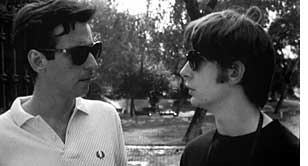 "What
if?" stories like this, revolving around actual historical figures, can
be a lot of fun. Peter Schaffer's 1979 play, Amadeus, and the 1984
Milos Forman film - wherein the rivalry between composers Salleri and Mozart
is greatly exaggerated - is one of the best examples of this genre. A similar
case is Nicolas Roeg's 1985 Insignificance, which featured Albert
Einstein, Marilyn Monroe, Joe Dimaggio and Senator McCarthy meeting at the
same hotel. The Hours And Times
is in this same vein. Before we discuss the film, this is how John Lennon,
himself, addressed the subject in the Playboy interview he and Yoko
Ono granted in 1980, just before his tragic death: "What
if?" stories like this, revolving around actual historical figures, can
be a lot of fun. Peter Schaffer's 1979 play, Amadeus, and the 1984
Milos Forman film - wherein the rivalry between composers Salleri and Mozart
is greatly exaggerated - is one of the best examples of this genre. A similar
case is Nicolas Roeg's 1985 Insignificance, which featured Albert
Einstein, Marilyn Monroe, Joe Dimaggio and Senator McCarthy meeting at the
same hotel. The Hours And Times
is in this same vein. Before we discuss the film, this is how John Lennon,
himself, addressed the subject in the Playboy interview he and Yoko
Ono granted in 1980, just before his tragic death: |
|
|
|
| There seems to be no reason to disbelieve Mr. Lennon; it's not like a one night stand with Epstein would have ruined his reputation after all those years. Other sources have disputed his claim, asserting that the affair did take place but it is all based on hearsay. This is a terrific topic for a film, rife with dramatic conflict. Perhaps it might only appeal to gay Beatles fans but that does nothing to diminish its charm. | |
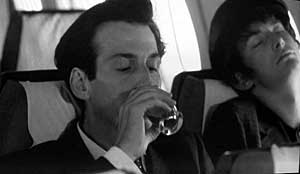 Epstein
(David Angus) and Lennon (Ian Hart) are first seen on board a plane. Lennon
is asleep and Epstein, cradling a drink, gazes at him longingly. When Lennon
awakes, and gives the stewardess the phone number to their hotel, ("She
was just a bird!"), Epstein admonishes him and insists that they have
come to Barcelona to "rest." Yeah, right. It soon becomes clear that Epstein
has other hopes for their holiday together. Epstein
(David Angus) and Lennon (Ian Hart) are first seen on board a plane. Lennon
is asleep and Epstein, cradling a drink, gazes at him longingly. When Lennon
awakes, and gives the stewardess the phone number to their hotel, ("She
was just a bird!"), Epstein admonishes him and insists that they have
come to Barcelona to "rest." Yeah, right. It soon becomes clear that Epstein
has other hopes for their holiday together. |
|
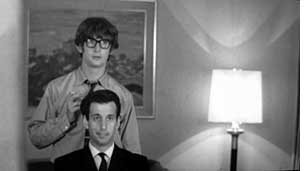 Surprisingly,
it is Lennon who brings up the elephant in the room - if only to reiterate
that he is not interested. "It puts me off to think about doing it," Lennon
declares, to which Epstein replies, "But you do think about it,
no less." Epstein won't be deterred; he asks Lennon if he is happy being
tied down so young with a wife, Cynthia, and their newborn son. You can
cut the sexual tension between them with a knife. Following an afternoon
of sightseeing, Epstein takes Lennon to a gay bar. When another man joins
them for a drink, Lennon's good intentions backfire when he tries to fix
Epstein up with the man by inviting him back to their hotel room. Later
in the film, Lennon listens attentively as Epstein delivers a touchng monologue
about sometimes getting lucky while cruising public toilets by the docks.
He shares an all-too common (for the time) story about getting beat up and
subsequently blackmailed when his assailant recognized his family's
name. Surprisingly,
it is Lennon who brings up the elephant in the room - if only to reiterate
that he is not interested. "It puts me off to think about doing it," Lennon
declares, to which Epstein replies, "But you do think about it,
no less." Epstein won't be deterred; he asks Lennon if he is happy being
tied down so young with a wife, Cynthia, and their newborn son. You can
cut the sexual tension between them with a knife. Following an afternoon
of sightseeing, Epstein takes Lennon to a gay bar. When another man joins
them for a drink, Lennon's good intentions backfire when he tries to fix
Epstein up with the man by inviting him back to their hotel room. Later
in the film, Lennon listens attentively as Epstein delivers a touchng monologue
about sometimes getting lucky while cruising public toilets by the docks.
He shares an all-too common (for the time) story about getting beat up and
subsequently blackmailed when his assailant recognized his family's
name. |
|
| What's nice about the film is that Lennon, when he isn't teasing Epstein, tries to be supportive. After all, The Beatles might have been still playing in the Cavern Club if it wasn't for "Eppie." It is clear that he respects him as a mentor; Lennon came from working class Liverpool, Epstein had class, education and style. Maybe deep down he might fancy a shag with "the fifth Beatle" while away from everyone in Barcelona. He is certainly aloof to his wife when she calls on the telephone. | |
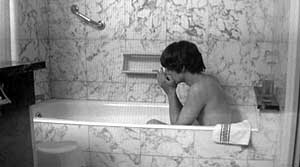 [Spoiler
alert: Skip this paragraph if you don't want to know how it plays
out. Epstein will walk in on Lennon taking a bath. Lennon is either
oblivious to Epstein's feelings or being a cocktease when he asks his love-struck
manager to scrub his back. The inevitable passion erupts between them but
ends just as abruptly when Lennon applies the brakes. "And with that," Epstein
mutters, sadly, "whatever never was is ended." Before they can trash out
their emotions, the telephone rings and the stewardess from their flight
is waiting in the hotel's lobby. This was a believable scene, especially
in light of the fact that we don't know and never will know what
really happened. It will satisfy all viewers - those who want Lennon
to "go for it" and those who are convinced that the rebellious Beatle was
terminally straight. Even so, a brief shot near the film's final scenes
(one of which is a flashback to Liverpool) shows the two of them lying in
the same bed and the viewer is left with a sense of ambiguity.] [Spoiler
alert: Skip this paragraph if you don't want to know how it plays
out. Epstein will walk in on Lennon taking a bath. Lennon is either
oblivious to Epstein's feelings or being a cocktease when he asks his love-struck
manager to scrub his back. The inevitable passion erupts between them but
ends just as abruptly when Lennon applies the brakes. "And with that," Epstein
mutters, sadly, "whatever never was is ended." Before they can trash out
their emotions, the telephone rings and the stewardess from their flight
is waiting in the hotel's lobby. This was a believable scene, especially
in light of the fact that we don't know and never will know what
really happened. It will satisfy all viewers - those who want Lennon
to "go for it" and those who are convinced that the rebellious Beatle was
terminally straight. Even so, a brief shot near the film's final scenes
(one of which is a flashback to Liverpool) shows the two of them lying in
the same bed and the viewer is left with a sense of ambiguity.] |
|
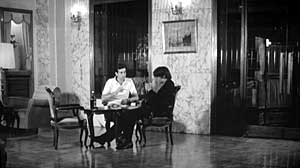 The
Hours And Times
beautifully conveys the relationship between these two very different men.
In other circles, Lennon might have been nothing more than a piece of rough
trade to the more erudite Epstein. Instead, the object of his lust will
soon be one of the most famous men in the world as well as one of the twentieth
century's most important artists. The early days afforded Epstein a measure
of control over his creations but the lads from Liverpool, especially Lennon,
would soon be exercising their independence. Epstein and Lennon embody a
master-slave dynamic and, by the end of the film, it is clear who is on
top. The
Hours And Times
beautifully conveys the relationship between these two very different men.
In other circles, Lennon might have been nothing more than a piece of rough
trade to the more erudite Epstein. Instead, the object of his lust will
soon be one of the most famous men in the world as well as one of the twentieth
century's most important artists. The early days afforded Epstein a measure
of control over his creations but the lads from Liverpool, especially Lennon,
would soon be exercising their independence. Epstein and Lennon embody a
master-slave dynamic and, by the end of the film, it is clear who is on
top. |
|
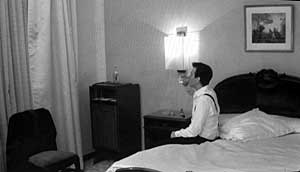 The
decision to film in black and white may have been for budgetary reasons,
but the monochromatic palette recalls the look of The Beatles' classic film,
A Hard Day's Night - crossed, perhaps, with a 60s arthouse flick.
Munch allows many scenes to play out without a background score. The melancholy
piano music underscoring a few movements is Bach's Goldberg Variations
and it adds an air of romance and sadness to the proceedings. Munch trusts
his actors enough to champion several scenes captured in one long take. The
decision to film in black and white may have been for budgetary reasons,
but the monochromatic palette recalls the look of The Beatles' classic film,
A Hard Day's Night - crossed, perhaps, with a 60s arthouse flick.
Munch allows many scenes to play out without a background score. The melancholy
piano music underscoring a few movements is Bach's Goldberg Variations
and it adds an air of romance and sadness to the proceedings. Munch trusts
his actors enough to champion several scenes captured in one long take. |
|
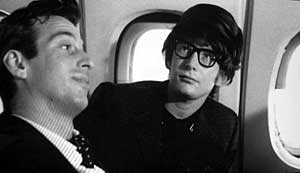 The
acting by both is terrific. David Angus underplays Epstein splendidly, coming
across as Oscar Wilde's distant
cousin on Valium and not as a grand fop. Ian Hart's performance is such
a marvel that he was cast again as Lennon in 1994's Backbeat,
another film about The Beatles' early days, this time taking place when
they played the clubs in Hamburg, Germany. Backbeat explored John's
relationship with his art school chum, Stuart Sutcliffe - who was The Beatles'
first bass guitarist until Paul McCartney wanted him out of the band. Sutcliffe
stayed behind in Hamburg where he died of a brain hemorrhage. (There would
be a hint of homoeroticism in that film as well.) Hart, at times,
bears a striking resemblance to Lennon but, most importantly, he captures
the man's personality, voice inflections, body language and attitude to
such a degree that you sometimes think that it is really him on screen. The
acting by both is terrific. David Angus underplays Epstein splendidly, coming
across as Oscar Wilde's distant
cousin on Valium and not as a grand fop. Ian Hart's performance is such
a marvel that he was cast again as Lennon in 1994's Backbeat,
another film about The Beatles' early days, this time taking place when
they played the clubs in Hamburg, Germany. Backbeat explored John's
relationship with his art school chum, Stuart Sutcliffe - who was The Beatles'
first bass guitarist until Paul McCartney wanted him out of the band. Sutcliffe
stayed behind in Hamburg where he died of a brain hemorrhage. (There would
be a hint of homoeroticism in that film as well.) Hart, at times,
bears a striking resemblance to Lennon but, most importantly, he captures
the man's personality, voice inflections, body language and attitude to
such a degree that you sometimes think that it is really him on screen. |
|
|
The Hours and Times was part of the explosion that became known as "The New Queer Cinema," at Sundance in 1992, when it was screened with Derek Jarman's Edward II, Tom Kalin's Swoon and Greg Arraki's The Living End.
|
|
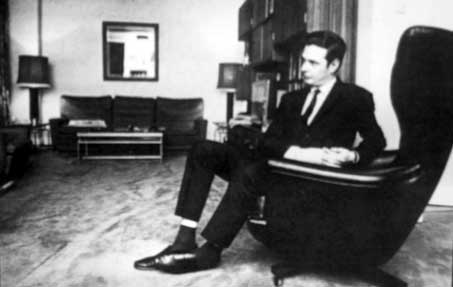 |
|
| What prompted me to suddenly revisit The Hours And Times was a so-so documentary about Brian Epstein that I rented from Netflix. Brian Epstein: Inside The Fifth Beatle is a short (60 minute) documentary that's a good introduction for the uninitiated but leaves out way too much to satisfy longtime Beatles aficionados. | |
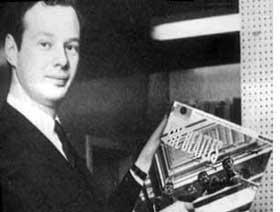 Brian
Epstein, as mentioned earlier, was the manager of The Beatles.
Inside The Fifth Beatle does an adequate job presenting the
main biographical facts. The opening scenes involving Epstein's record store
are actually quite interesting, and his hunt for "My Bonnie," an obscure
platter on which The Beatles had first appeared while backing up Tony Sheridan,
is rather fun. A lot of screentime is devoted to Epstein playing Pygmallion
as he remakes The Beatles, and to the sacking of original drummer Pete Best.
The narrators make it clear that he managed other artists too, such as Gerry
And the Pacemakers and Cilia Black. However, once The Beatles become a worldwide
sensation, the film becomes rushed and, before we know it, Epstein dies
in 1967 from a drug overdose. Brian
Epstein, as mentioned earlier, was the manager of The Beatles.
Inside The Fifth Beatle does an adequate job presenting the
main biographical facts. The opening scenes involving Epstein's record store
are actually quite interesting, and his hunt for "My Bonnie," an obscure
platter on which The Beatles had first appeared while backing up Tony Sheridan,
is rather fun. A lot of screentime is devoted to Epstein playing Pygmallion
as he remakes The Beatles, and to the sacking of original drummer Pete Best.
The narrators make it clear that he managed other artists too, such as Gerry
And the Pacemakers and Cilia Black. However, once The Beatles become a worldwide
sensation, the film becomes rushed and, before we know it, Epstein dies
in 1967 from a drug overdose. |
|
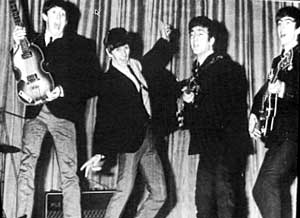 Numerous
talking heads literally gush about how great a manager Epstein was
to the point that this doc turns into a love letter to him. Yes, his role
in The Beatles' unprecedented success is beyond question. His marketing
skills, however, far outshined his business acumen. The film barely touches
on his financial ineptitude except to report that United Artists was all
set to give The Beatles 25% of the A Hard Day's Night soundtrack
until Epstein came in and firmly stated that they would take no less than
7 1/2. Truth be told, Epstein made a lot of bad business deals, losing his
lads millions, and it has even been suggested that he might have been killed
because of it. The Fifth Beatle
never soars, like some documentaries do, because it never explores these
more controversial topics in-depth. Some thought Epstein's death was a suicide
and this isn't even mentioned. A narrator tells how Epstein lost
his influence over The Beatles and there is so much that could have
been elaborated on at that point. Like, for example. one of his last papers
was a plea for the cover of Sergeant Pepper's Lonely Hearts Club
to be a plain paper bag to avoid lawsuits. Without these nuggets, it's like
reading the Cliff Notes or those old Reader's Digest Condemsed
Books that always left out the naughty bits. Numerous
talking heads literally gush about how great a manager Epstein was
to the point that this doc turns into a love letter to him. Yes, his role
in The Beatles' unprecedented success is beyond question. His marketing
skills, however, far outshined his business acumen. The film barely touches
on his financial ineptitude except to report that United Artists was all
set to give The Beatles 25% of the A Hard Day's Night soundtrack
until Epstein came in and firmly stated that they would take no less than
7 1/2. Truth be told, Epstein made a lot of bad business deals, losing his
lads millions, and it has even been suggested that he might have been killed
because of it. The Fifth Beatle
never soars, like some documentaries do, because it never explores these
more controversial topics in-depth. Some thought Epstein's death was a suicide
and this isn't even mentioned. A narrator tells how Epstein lost
his influence over The Beatles and there is so much that could have
been elaborated on at that point. Like, for example. one of his last papers
was a plea for the cover of Sergeant Pepper's Lonely Hearts Club
to be a plain paper bag to avoid lawsuits. Without these nuggets, it's like
reading the Cliff Notes or those old Reader's Digest Condemsed
Books that always left out the naughty bits. |
|
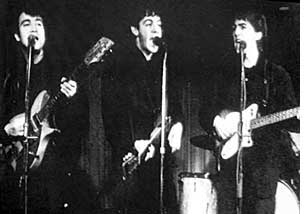 To
its credit, the film does acknowledge Epstein's sexuality even if
briefly. It is noted that buggery was illegal in Britain at that time and
that, unlike another man named Brian from Queer
As Folk, Epstein had to be very discrete. "Eppie" certainly wasn't
Joe Orton - whose
script for the third Beatles movie was, by the way, rejected by Epstein
for being too risque. [Note: this is imagined in the great Orton bio-pic,
Prick Up Your Ears.]
His trip to Barcelona with Lennon is mentioned but the sexual question never
arises. Instead, one associate asserts that Epstein took Lennon there to
talk him into getting on the same page as Paul McCartney, concerning the
group's image. Another talking head vehemently debunks the myth that Epstein
signed up The Beatles just because he was in love with Lennon. While he
is correct, the commentator is blinding himself to the reality that
Epstein was very excited when he first saw his lads clad in leather
jackets on the Cavern Club's stage. In fact, the following hilarious faux
interview with the queer manager's mother in the Eric Idle/Neil Innes Beatles
spoof, The Rutles: All You Need Is Cash, isn't that far from the
truth. To
its credit, the film does acknowledge Epstein's sexuality even if
briefly. It is noted that buggery was illegal in Britain at that time and
that, unlike another man named Brian from Queer
As Folk, Epstein had to be very discrete. "Eppie" certainly wasn't
Joe Orton - whose
script for the third Beatles movie was, by the way, rejected by Epstein
for being too risque. [Note: this is imagined in the great Orton bio-pic,
Prick Up Your Ears.]
His trip to Barcelona with Lennon is mentioned but the sexual question never
arises. Instead, one associate asserts that Epstein took Lennon there to
talk him into getting on the same page as Paul McCartney, concerning the
group's image. Another talking head vehemently debunks the myth that Epstein
signed up The Beatles just because he was in love with Lennon. While he
is correct, the commentator is blinding himself to the reality that
Epstein was very excited when he first saw his lads clad in leather
jackets on the Cavern Club's stage. In fact, the following hilarious faux
interview with the queer manager's mother in the Eric Idle/Neil Innes Beatles
spoof, The Rutles: All You Need Is Cash, isn't that far from the
truth. |
|
|
|
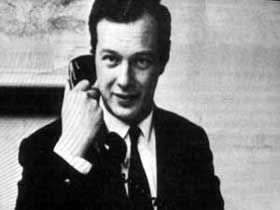 Brian
Epstein: Inside The Fifth Beatle
is a decent primer about the man but it leaves the filmgoer still feeling
hungry. Undoubtedly due to budgetary restrictions, their choice of talking
heads was limited. Lennon's sister offers her reminiscences but obvious
missing persons include the two surviving Beatles (although McCartney's
voice is heard a couple times). Producer George Martin is absent too. The
word "obscure" doesn't even begin to describe some of the commentating
musicians that do appear - I've never even heard of Paddy,
Klaus & Gibson, let alone their drummer. There also isn't a single Beatle
song heard in the film. Brian
Epstein: Inside The Fifth Beatle
is a decent primer about the man but it leaves the filmgoer still feeling
hungry. Undoubtedly due to budgetary restrictions, their choice of talking
heads was limited. Lennon's sister offers her reminiscences but obvious
missing persons include the two surviving Beatles (although McCartney's
voice is heard a couple times). Producer George Martin is absent too. The
word "obscure" doesn't even begin to describe some of the commentating
musicians that do appear - I've never even heard of Paddy,
Klaus & Gibson, let alone their drummer. There also isn't a single Beatle
song heard in the film. |
|
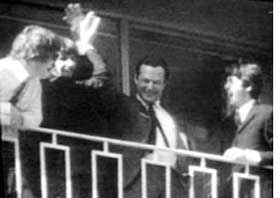 But,
all griping aside, there is enough archival footage and old photographs
of The Beatles from the Hamburg, Germany days in the movie to command your
attention and, despite its brevity, it does tell most of the man's
story. A most fitting coda is Brian waving from a balcony with The Beatles
in the film's last shot. There were four possible "fifth Beatles." There
was Stuart Sutcliff, who first played bass. There was Pete Best, their original
drummer. There was George Martin, whose producing skills in the studio and
contributions to the Beatles' sound cannot be overstated. And finally, Epstein.
Whether or not the trousers had anything to do with it, Epstein created
a pop phenomenon that has yet to be repeated at the same world-wide level.
And he should be remembered for that. But,
all griping aside, there is enough archival footage and old photographs
of The Beatles from the Hamburg, Germany days in the movie to command your
attention and, despite its brevity, it does tell most of the man's
story. A most fitting coda is Brian waving from a balcony with The Beatles
in the film's last shot. There were four possible "fifth Beatles." There
was Stuart Sutcliff, who first played bass. There was Pete Best, their original
drummer. There was George Martin, whose producing skills in the studio and
contributions to the Beatles' sound cannot be overstated. And finally, Epstein.
Whether or not the trousers had anything to do with it, Epstein created
a pop phenomenon that has yet to be repeated at the same world-wide level.
And he should be remembered for that. |